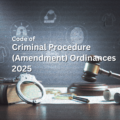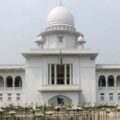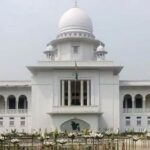This edition of ‘From the Court Corridor’ curates the notable pronouncements of the Appellate Division (AD) and the High Court Division (HCD) of the Supreme Court (SC) of Bangladesh in November 2023.
AD grants bail to JnU student Khadija
Jagannath University student Khadija Kubra was finally released from Kashimpur jail after spending over 14 months in prison. This comes after the AD upheld an HCD order granting her bail in two separate cases filed under the now-abolished Digital Security Act (DSA). The six-member bench was headed by Chief Justice Obaidul Hassan.
In October 2020, the police filed cases against Khadija and retired Major Delowar Hossain under the Digital Security Act, 2018. The prosecution alleged that Khadija and Delowar worked together to spread misinformation and slander about the prime minister, government agencies, and high-ranking officials in order to undermine the legitimate government and incite discord among different communities by promoting animosity and hatred. The cause of action was that Khadija hosted a webinar where former major Delowar Hossain living abroad was her guest who is known for his anti-government rhetoric. Khadija was arrested in September 2022. Though the police showed her to be an adult, Khadija was only 17 according to her lawyer. The District Court denied her bail repeatedly despite her being a kidney patient. The HCD granted her bail on 16 February 2023 which was stayed by the chamber court. On 10 July 2023, the Bench, led by the former chief justice Hasan Foez Siddique, adjourned and stood over all four petitions for four months.
The instance of Khadija shows how draconian and vaguely drafted the Digital Security Act, 2018 was. Khadija also represents the thousands of people who are languishing in jail for the mismanagement of the administration of justice. The case is a testimony to the fact that our justice system is still indifferent to the most basic fundamental right enshrined in our constitution and international human rights instrument – Right to life and Liberty.
SC upholds the cancellation of the registration of Bangladesh Jamat-E-Islami
The SC of Bangladesh upheld a verdict by the HCD that revoked Jamaat-e-Islami’s registration as a political party. The five-member bench led by Chief Justice Obaidul Hassan dismissed Jamaat’s appeal as the principal lawyer of the party AJ Mohammad Ali and its Advocate-On-Record Zainul Abedin were absent during the hearing. Senior lawyers Tanya Amir and Ahsanul Karim appeared for the respondent during the proceedings. Advocate Mohammad Ziaur Rahman, representing the absent lawyers of Jamat-e-Islami, confirmed that the HCD’s decision to cancel Jamaat’s registration remains in effect. In the hearing, the party filed a six-week time petition due to personal reasons which was rejected. There were also two petitions alongside this appeal for hearing. The first petition sought to hold Jamaat in contempt of court for continuing political activities while their appeal was pending. The second petition requested an injunction to prevent Jamaat from using their name or banner for rallies and meetings. The SC dismissed both of them as it had already dismissed the appeal from which these petitions arose.
This dismissal arose from an HCD verdict in 2023 that revoked Jamaat-e-Islami’s registration with the Election Commission as the constitution of the party violated the secularism clause of the constitution of Bangladesh. The HCD’s judgement cancelled the party’s registration with the Election Commission which, in turn, stopped the party from participating in elections or using party symbols. The writ petition seeking the cancellation of the registration was filed by Maulana Syed Rezaul Haque Chandpuri, along with two others. However, the Advocate of the SC, Faizullah Faiz opined that the absence of the lawyers of the party might be strategic.
SC allows Ashiyan City to carry out the housing project near Dhaka City
The SC has given the green light to a 33-acre housing project carried out by Ashiyan City Development Company. The verdict was given by the six-member AD bench headed by Chief Justice Obaidul Hassan. The other members of the bench were Justice Burhanuddin, Justice M Enayetur Rahim, Justice Md Ashfaqul Islam, Justice Md Abu Zafor Siddique and Justice Jahangir Hossain Selim.
The two appeals against the judgement of the HCD were filed by the government along with eight rights organisations including Bangladesh Environmental Lawyers Association (BELA), Bangladesh Legal Aid and Services Trust (BLAST), Ain O Salish Kendra (ASK). The writ petition was filed on the ground that the Ashiyan City illegally filled up wetlands and farmlands, sold plots without approval, received undue authorization and also held land exceeding legal limits. In an earlier judgement, HCD held the housing project as illegal. However, following a review filed by the Ashiyan City, the HCD set aside its previous judgement.
Though the AD allowed the housing project, it scrapped the review judgement by the High Court Division considering the fact that the alleged ‘No-objection’ in favour of the respondent Ashiyan City cannot be said as discovery of new fact or evidence which after due exercise of diligence was not in the knowledge of the writ petitioner or could not be produced by him when the judgement was delivered. Moreover, the review application was filed after a long lapse of time beyond the limit of prescribed time in law.




















